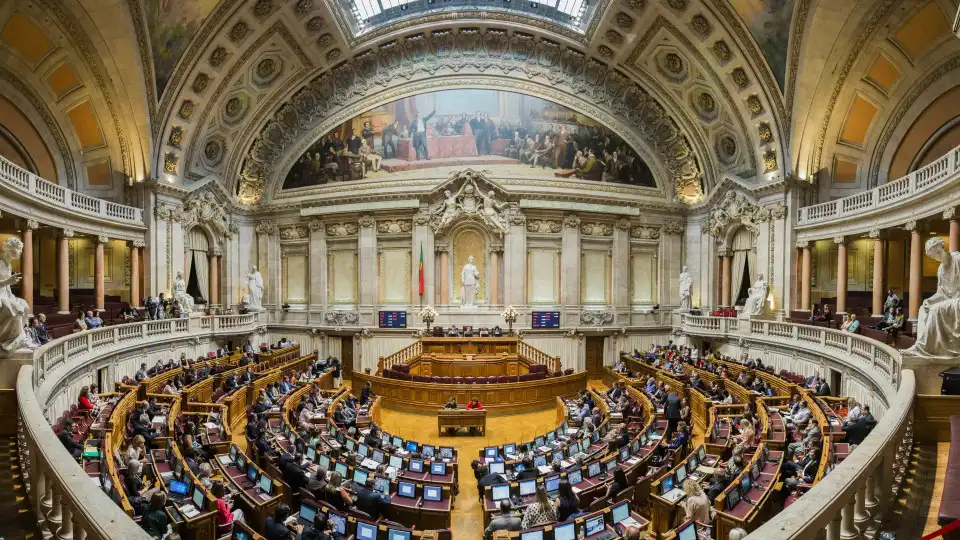Electoral compensation circle proposed by Livre, IL, BE and PAN
The two largest parliamentary benches -- PSD and PS -- today blocked the intention of Livre, IL, BE and PAN to create a national compensation circle in the electoral system for the Assembly of the Republic.

© Global Imagens

País PSD e PS
No debate, the only idea that deserved a greater consensus came from the socialist bench and was related to the creation of a working group, within the scope of the Constitutional Affairs Committee, for the codification of electoral legislation.
In relation to the other diplomas under debate, the Livre party put forward a proposal to create a national compensation constituency of 37 deputies, the Liberal Initiative of 30 and the Left Bloc of ten, with the PAN extending its proposals to the principle of aggregating electoral constituencies.
All these political forces, as well as the PCP, considered that the current electoral system for the Assembly of the Republic, with the progressive decrease in population in the inland areas and its concentration on the coast, reduces territorial representation and reduces proportionality, benefiting the PSD and the PS.
On the part of the PSD, deputy Hugo Carneiro accused the authors of the projects of intending to obtain "office gains" in terms of representation from changes to be made to the electoral system. He focused the PSD's priority on changes to improve the vote of emigrants -- a point on which he criticized the PS.
The vice-president of the socialist bench Pedro Delgado Alves stressed that the electoral system is the cornerstone of the constitutional regime and left a warning: "We would be doing a disservice to Portuguese democracy if we were to revolutionize something that does not need any revolution and that has been fulfilling its mission".
Pedro Delgado Alves then defended that the Proportionality Index of the Portuguese electoral system -- the relationship between the percentage of votes and the percentage of seats -- "is consistently above 90%, a very good average when compared to other democracies".
"Electoral engineering tends to go wrong, because it does not count on the autonomy of the voters", he also argued.
The harshest intervention against Pedro Delgado Alves came from the spokesman for Livre, Rui Tavares, who invoked the case of Portalegre, which only elects two deputies.
"We are facing a crisis of representation in the country for reasons of geographical origin. We are talking about civic rights. We are talking about reasonable equality", he stressed.
Harsh criticism of the PSD and PS also came from the deputy of the Liberal Initiative Rodrigo Saraiva, accusing these parties of using the argument "that it is not time" to stop the revision of the electoral law.
"The responsibility for governability and stability lies with the 230 deputies and not with the voters. We are facing a Central Bloc of excuses, they never want to solve anything", he accused.
Far from the tone used by the PSD, the deputy of the CDS-PP João Almeida admitted the discussion of these issues in the specialty, but criticized the option of the Liberal Initiative to join in the same diploma issues such as the end of the day of reflection, the greater flexibility in the scheduling of the election day and the creation of a national compensation constituency.
On the part of the PCP, António Filipe did not oppose the creation of a national compensation constituency as a principle and recognized that the current system benefits the PS and the PSD, but pointed out difficulties in the projects of the Livre, the Liberal Initiative and the PAN. If they were implemented, as they are, they would introduce aggravated problems of representation in a greater number of electoral constituencies.
The deputy of the PAN, Inês de Sousa Real, considered it "unacceptable that the electoral system remains crystallized, with a high number of wasted votes". Paulo Muacho, of the Livre party, estimated that almost 20% of the total votes were "wasted", that is, they are not used for conversion into mandates.
The parliamentary leader of the Left Bloc, Fabian Figueiredo, sought to emphasize that his bench presented a more "moderate" project, with a smaller national compensation constituency of ten deputies, than the Liberal Initiative and Livre. He argued that the BE project would introduce minor changes in the set of current district constituencies.
The Chega bench defended the creation of a compensation constituency, considering that it was facing a "selfishness" of the PS and the PSD, but also the reduction in the number of deputies. Chega focused its interventions on improving the vote of emigrants.
Read Also: Debate on compensation for former colonies scheduled for May 15 (Portuguese version)

Descarregue a nossa App gratuita.
Oitavo ano consecutivo Escolha do Consumidor para Imprensa Online e eleito o produto do ano 2024.
* Estudo da e Netsonda, nov. e dez. 2023 produtodoano- pt.com



